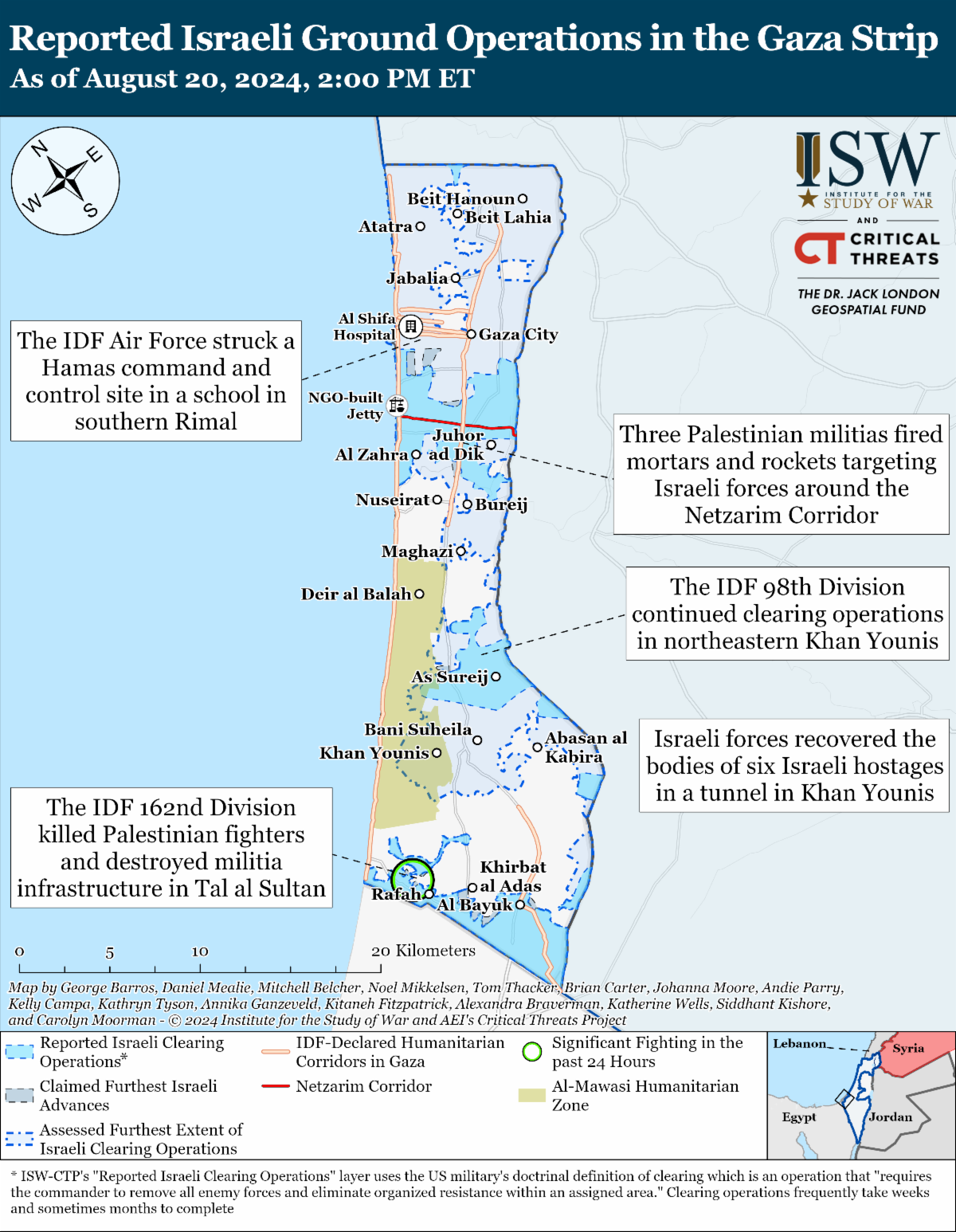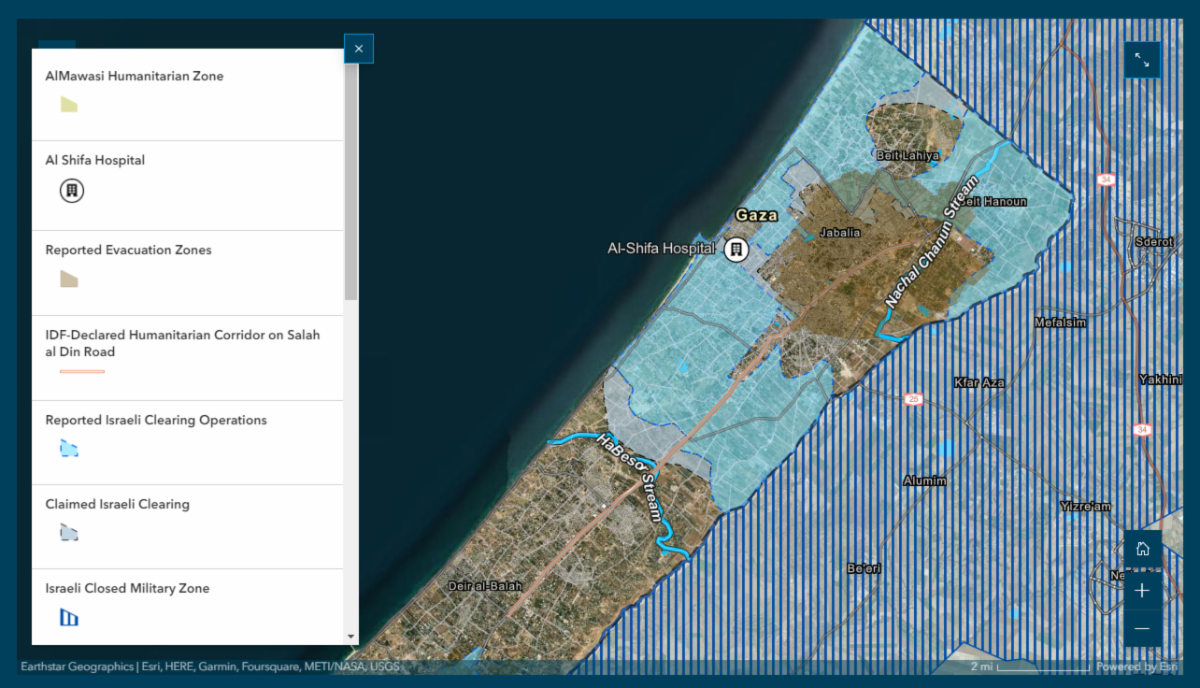Senior Islamic Revolutionary Guards Corps (IRGC) officials have continued signaling that Iran will attack Israel directly in response to Israel killing several senior Axis of Resistance leaders, including Hamas Political Bureau Chairman Ismail Haniyeh, in recent weeks. IRGC Deputy Commander Brigadier General Ali Fadavi warned on August 20 that Iran will “definitely” retaliate against Israel “at the suitable time and place.” Fadavi also warned that Israel “will be punished more severely than before,” likely referring to the large-scale Iranian drone and missile attack on Israel in April 2024. CTP-ISW previously assessed that Iran likely seeks to cause greater damage to Israel than it did in its April 2024 attack in order to restore deterrence with Israel. The United States, Israel, and their allies intercepted most of the projectiles that Iran and its allies fired at Israel in April 2024, so that the Iranian attack inflicted significantly less damage than Tehran intended. IRGC spokesperson Brigadier General Ali Mohammad Naeini separately stated on August 20 that Iran is not rushing to retaliate against Israel. Naeini, as the IRGC spokesperson, is the IRGC’s chief media officer and responsible for external messaging. Naeini claimed that Iran’s “right” to respond to Haniyeh’s death is unrelated to current ceasefire-hostage negotiations between Israel and Hamas, which mirrors similar statements from senior Iranian political officials in recent days. This statement notably differs from recent Western reports that Iran would refrain from attacking Israel if Israel reached a ceasefire-hostage agreement with Hamas. The Western reports may reflect the views of more moderate factions, such as President Masoud Pezeshkian and his allies, within the regime, while the IRGC and Iranian security establishment more broadly still seemingly seeks to conduct a direct strike on Israel regardless of whether Israel and Hamas conclude a ceasefire-hostage agreement. Naeini’s remark that Iran is not rushing its retaliation is consistent with CTP-ISW’s assessment that Iran is likely delaying its attack in part to stoke psychological terror among Israelis.
Disagreements between Egypt and Israel over control of the Egypt-Gaza Strip border remain an obstacle to a ceasefire-hostage agreement. US, Egyptian, and Israeli negotiators in Cairo discussed control of the border area, known as the Philadelphi Corridor, on August 18 and 19. Israeli negotiators presented a map at the talks showing Israel reducing its forces but maintaining full control of the corridor, according to unspecified Israeli officials speaking to Axios. Controlling the Philadelphi Corridor will prevent Hamas and other Palestinian militias from rebuilding their capabilities quickly by interdicting smuggling into the Gaza Strip, as CTP-ISW has argued previously. Axios reported that Israeli Defense Minister Yoav Gallant and the heads of the Israeli security services have concluded they can mitigate the risk of forces from the Philadelphi Corridor by building a monitoring mechanism over several months. Arab media separately reported that Israel requested to introduce a written agreement that stipulates Israel’s "supervision” over the Palestinian side of the Philadelphi Corridor to the Camp David Accords peace deal with Egypt. Egypt had previously threatened to suspend the Camp David Accords over an Israeli presence along the corridor. Egypt denied the proposal that would permit a reduced Israeli force presence along the corridor and the request to formally alter the Camp David Accords terms. Israeli Prime Minister Benjamin Netanyahu told Israeli hostages’ families on August 20 that “under no circumstances” will Israeli forces leave the Philadelphi Corridor. Hamas rejected the most recent US proposal for changing previously agreed upon terms, including allowing a reduced Israeli force presence along the Philadelphi Corridor. Hamas has consistently demanded a full Israeli withdrawal from the Gaza Strip under a ceasefire deal.
Israeli forces recovered the bodies of six Israeli hostages in a tunnel in Khan Younis on August 20. The IDF 35th Paratroopers Brigade, the 75th Armored Battalion (7th Brigade), Yahalom special operations engineers, and Shin Bet forces operated under the IDF 98th Division to retrieve the bodies. The IDF stated that precise intelligence from Shin Bet enabled the operation. Israeli forces located a 10-meter-deep tunnel shaft that led to a tunnel system where Israeli forces located the hostages’ bodies. The IDF added that Israeli forces searched nearby buildings and killed several Palestinian fighters in the area before the operation. Palestinian fighters guarding the tunnel were killed or fled as Israeli forces approached the area. An Israeli military correspondent reported that the operation was the “fastest" recovery operation conducted during the war. The military correspondent reported that the Israeli forces had achieved “operational control” in a single day over one of the neighborhoods in which the hostages’ bodies were believed to be held. The IDF did not specify in which neighborhood the recovery operation occurred. The IDF 35th Paratroopers Brigade expanded operations to western Khan Younis on August 18 and advanced into Hamad neighborhood—an area formerly designated as part of the al Mawasi humanitarian zone until the IDF declassified it on August 16.
Key Takeaways:
- Iranian attack on Israel: Senior Islamic Revolutionary Guards Corps (IRGC) officials have continued signaling that Iran will attack Israel directly in response to Israel killing several senior Axis of Resistance leaders, including Hamas Political Bureau Chairman Ismail Haniyeh, in recent weeks.
- Israel-Hamas ceasefire-hostage negotiations: Disagreements between Egypt and Israel over control of the Egypt-Gaza Strip border remain an obstacle to a ceasefire-hostage agreement.
- Iraq: Several Iranian-backed Iraqi militias have threatened to resume attacks targeting US forces in order to expel the United States from the Middle East.
- Iran: IRGC Rear Admiral Ali Akbar Ahmadian will likely keep his current position as secretary of the Iranian SNSC under the Masoud Pezeshkian administration, according to United Kingdom-based Amwaj Media.
| 






 [ISW] 이스라엘-하마스 전쟁(이란) 업데이트, 2024년 8월 21일
[ISW] 이스라엘-하마스 전쟁(이란) 업데이트, 2024년 8월 21일
 [ISW] 러시아 공세 캠페인 평가, 2024년 8월 20일
[ISW] 러시아 공세 캠페인 평가, 2024년 8월 20일